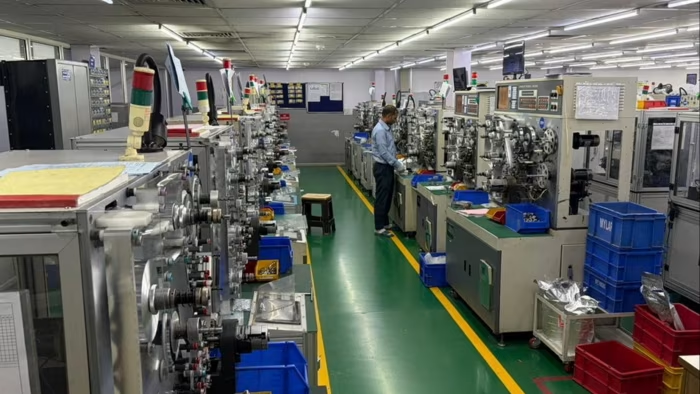In a factory complex in Noida, an industrial hub outside New Delhi, Vinod Sharma, the managing director of an Indian electronic component maker, is trying to improve the skills of a small part of India’s vast but poorly trained workforce.
“We teach people from zero,” says Sharma at Deki Electronics, which supplies capacitors to an array of industries in Asia, Europe and the Middle East.
Even day-to-day life in the workplace has to be taught, he says. “We have to go to the extent of teaching them how to walk on the stairs, how to walk in the corridor, because they have never been in a building like this,” says Sharma.
With Prime Minister Narendra Modi focused on boosting Swadeshi — locally made products — as punitive US tariffs squeeze export industries and threaten to put a damper on the world’s fastest-growing large economy, the opportunities for India’s workforce of more than 600mn have rarely been greater.
Yet government officials and leaders in industries from services to manufacturing to energy lament a critical shortfall of practical training, digital literacy and soft skills.
Modi has said that “skill development and employment are crucial needs in India”, at a time when he is luring in multinationals such as Apple, as he seeks to establish India as a manufacturing and services hub to rival the likes of China.
The UN’s most recent estimates from June have put the country’s population at 1.46bn, comfortably ahead of China’s 1.41bn, with nearly 68 per cent of Indians falling within the working age group of 15 to 64.
But only 4.4 per cent of its workforce aged 15 to 29 is formally skilled, according to India’s finance ministry, while the skill development ministry acknowledged that only just over half of India’s graduates have the “skills needed by a modern economy”.
This is “significantly lower than other large Asian economies”, noted a World Bank report last year, adding that “although India’s education system is of high quality, the supply of skilled labour is mediocre”.
300mn
Farm and non-farm workers in need of more training
According to the International Labour Organization, India’s “industry involvement in training is still low” with only 36 per cent of companies participating in upskilling programmes, against 85 per cent in China, 52 per cent in Russia, and 51 per cent in Brazil.
This year Modi kicked off several training and internship schemes, including a flagship government project with India’s top 500 public and private companies — including Jindal, Reliance and Tata — aimed at addressing the yawning skills gap. It has a five-year goal of placing 10mn young workers in industries including energy, automotive, food and banking.
Anil Bahuguna, chief of skill development at state-run energy company ONGC, which is participating in one of the government’s programmes, says that when it comes to oil and gas, the available labour force has “low technical exposure to field machinery and this adversely impacts the time and cost of a project”.
As India “navigates rapid technological and economic change, skills gaps, cited by 65 per cent of organisations as a major barrier, threaten to slow progress”, the government said when it rolled out “India Skills Accelerator” this year, the latest in a string of training programmes aimed at boosting employability.
These programmes form part of a drive to move away from India’s traditional placement landscape where workers used to get basic training through jobs in small and medium-sized enterprises.
“India’s skilling infrastructure has always been very, very small,” says Pronab Sen, an economist and former principal economic adviser to India’s Planning Commission, adding that as the economy expands and grows more sophisticated, “we need to meet the demands of the organised sector, the big companies”.
Abhinav Baliyan, managing director of Educator Extraordinaire, a company that runs vocational training centres in Jharkhand, says India has been unable to cash in fully on its “demographic dividend” of a vast growing working-age population.
This is partly because of a poorly skilled workforce. Four-in-five employers have reported difficulty finding the skilled talent they need in 2025, says recruiter Manpower, more than the global average, even as India has a higher demand for workers with IT and data skills than in China and Singapore.
While the Confederation of Indian Industry estimates that 10mn to 12mn young people enter the labour market annually, some 300mn farm and non-farm workers are already in need of being skilled, reskilled or upskilled to “achieve higher productivity”, says Manish Sabharwal of recruitment company Teamlease.
But the growing population could also put further pressure on fast-skilling the workforce. For Sourav Roy, chief of corporate social responsibility at Tata Steel, “there are more people that need skills than what we can actually offer in general” in India.
Rituparna Chakraborty, a board member at the Goa Institute of Management, says: “I don’t think we’ll ever have enough skilled people because India is in a position where more and more jobs will come dragging more people into the workforce, which means skilled workforce demand will keep on going up.”
Online skilling platform upGrad’s chair Ronnie Screwvala says that at the moment, India has a large pool of well-trained engineers and graduate-level workers in technology and computer sciences, but not enough focus has been put on practical skills. Indians now need training that “can offer immediate relevance”.
That much is clear to Ayush Tiwari, a graduate in biotechnology and beneficiary of the latest government programme. He is now an intern at the waste management unit of listed chemical company DCM Shriram in the state of Uttar Pradesh: “In the past six months, I have learned practically what I yearned for when I was studying.”
Back in Noida, 18-year-old Sachin Kumar, who travelled 700km to take a placement at what Deki calls its “Garden of Knowledge” training centre, is one beneficiary of India’s latest push on skills development. “I am not just learning to be a machine operator, but pretty much how to do anything at all,” he says.

